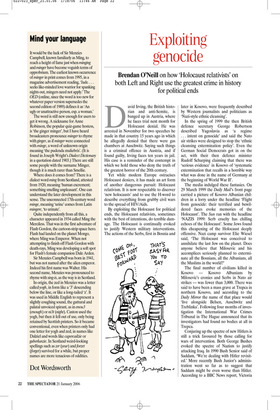Mind your language
It would be the luck of Sir Menzies Campbell, known familiarly as Ming, to reach a height of fame just when minging and minger have become voguish terms of opprobrium. The earliest known occurrence of minger in print comes from 1995, in a magazine advertisement reading, ‘Jade .. . seeks like-minded love warrior for spanking nights out, mingers need not apply.’ The OED (online, since the word is too new for whatever paper version supersedes the second edition of 1989) defines it as ‘An ugly or unattractive person, esp. a woman.’ The word is still new enough for users to get it wrong. A nickname for Anne Robinson, the popular quiz-game hostess, is ‘the ginger minger’, but I have heard broadcasters pronounce minger to rhyme with ginger, as if minger were connected with minge, a word of unknown origin meaning ‘the pudenda muliebris’. (It is found in Joseph Wright’s Dialect Dictionary in a quotation dated 1903.) There are still some people with the surname Minger, though it is much rarer than Smellie.
Where does it comes from? There is a dialect word ming from Scotland, attested from 1920, meaning ‘human excrement; something smelling unpleasant’. One can understand the later development in this sense. The unconnected 17th-century word minge, meaning ‘urine’ comes from Latin mingere, ‘to urinate’.
Quite independently from all this, a character appeared in 1934 called Ming the Merciless. That was in the first adventure of Flash Gordon, the cartoon-strip space hero. Flash had landed on the planet Mongo, where Ming was Emperor. When not attempting to finish off Flash Gordon with death-rays, Ming was developing a soft spot for Flash’s female companion Dale Arden.
Sir Menzies Campbell was born in 1941, but was not named after the alien emperor. Indeed his first name was Walter. His second name, Menzies was pronounced to rhyme with sing-is, as the way is in Scotland.
In origin, the zed in Menzies was a letter called yogh, in form like a ‘3’ descending below the line, or like a long-tailed ‘z’. It was used in Middle English to represent a slightly coughing sound, the guttural and palatal unvoiced spirant, as in enou3 (enough) or ni3t (night). Caxton used the yogh, but then it fell out of use, only being retained by Scottish printers. So it became conventional, even when printers only had one letter for yogh and zed, in names like Dalziel and words like capercailzie or gaberlunzie. In Scotland weird-looking spellings such as zer (year) and forzet (forget) survived for a while, but proper names are more tenacious of oddities.



















































 Previous page
Previous page